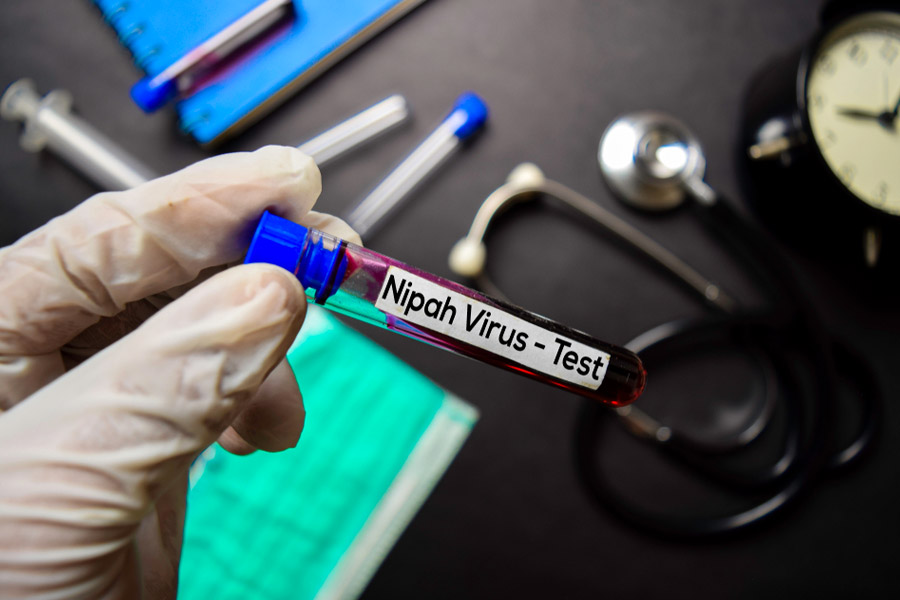The ICMR has sought collaboration with Indian industry partners for manufacturing indigenously developed monoclonal antibodies for treating deadly Nipah Virus following the successful animal trials to ensure their timely access during outbreaks.
Monoclonal antibodies are laboratory-made proteins that mimic the antibodies produced by the immune system to protect against foreign substances and harmful pathogens.
The Nipah virus (NiV), which has an extremely high fatality rate, has emerged as one of the most significant zoonotic threats to India, with repeated outbreaks recorded since 2001, according to the Expression of Interest (EoI) document issued by the Indian Council of Medical Research (ICMR).
The apex health research body has issued an EoI stating: "The ICMR is willing to collaborate with eligible organisations, companies, and manufacturers for the 'Development and Manufacturing of Monoclonal Antibodies against Nipah Viral Disease.'" Globally, research and development efforts are advancing, but no licensed vaccine or antiviral is yet available.
The document stated that several vaccine platforms are under investigation, including those supported by CEPI, with one candidate having progressed to mid-stage human trials, with India identified as a key site. Similarly, research at other international institutes is ongoing to develop vaccine candidates.
"However, these are still years away from licensure. On the therapeutic front, monoclonal antibodies (mAbs) have emerged as the most promising option," the ICMR document said.
The best-studied candidate is m102.4, a fully human monoclonal antibody targeting the G glycoprotein of the Nipah virus, which prevents viral entry by blocking its interaction with ephrin-B2/B3 receptors, according to the ICMR.
The m102.4 antibody has shown strong protection in animal models and has been found safe in Phase 1 clinical trials, it said. Though definitive human efficacy data are lacking, the antibody has been used under compassionate protocols in Australia and was also made available to Kerala during recent outbreaks, the EoI document stated.
The importance of having monoclonal antibody stocks ready for deployment in India cannot be overstated, the apex health research body said. Given the very high case fatality rate and the absence of licensed vaccines, mAbs represent the only currently feasible biomedical countermeasure, it said.
Their greatest value lies in post-exposure prophylaxis for high-risk contacts, such as healthcare workers exposed without adequate protection, family members in close contact, or laboratory personnel with accidental exposure. Administered early, they can potentially prevent disease onset, as demonstrated convincingly in animal models.
Additionally, in patients presenting early during infection, monoclonal antibodies may offer a therapeutic benefit by reducing viral load and limiting progression, thereby complementing supportive critical care, the document added.
Maintaining ready access to such antibodies ensures that India can act swiftly during an outbreak, it said. Pre-positioned stocks, streamlined regulatory and ethical approvals, and defined clinical protocols for prophylaxis and therapeutic use would allow immediate deployment without delays, which often occur when arrangements are attempted in the middle of an outbreak.
"This readiness, combined with continued strengthening of surveillance, infection control practices, and One Health investigations of bat reservoirs, will be critical for limiting the impact of Nipah virus outbreaks in the future," the document concluded.
"Looking ahead, India needs to build its own indigenous medical countermeasures against the Nipah virus, particularly monoclonal antibodies," the ICMR said.
The intent is to move forward through active collaboration with Indian industry partners for developing an indigenous monoclonal antibody platform and manufacturing stock, which will not only ensure timely and reliable access during outbreaks but also strengthen national preparedness for emerging viral threats, it added.
The ICMR-National Institute of Virology (ICMR-NIV), Pune, one of the constituent institutes of the Indian Council of Medical Research, has already initiated research and development in this direction, with experimental work at an advanced stage.
The ICMR-NIV has state-of-the-art laboratory infrastructure, including BSL-3 and BSL-4 facilities, and the team possesses expertise in outbreak investigations, surveillance, virological and molecular characterisation, vaccine candidate development through virus inactivation and molecular methods, and conducting preclinical trials in suitable animal models.
The institute also specialises in laboratory testing to evaluate antibody and immune responses in clinical trials at different phases (I, II, and III). The infrastructure and resources available at ICMR institutes, as indicated above at ICMR-NIV, will be leveraged for joint research, development, and preclinical studies.
According to the EoI document, the ICMR and its institutes will provide expert guidance and technical support in all phases of research and development for the creation of monoclonal antibodies against Nipah viral disease.
Except for the headline, this story has not been edited by The Telegraph Online staff and has been published from a syndicated feed.










